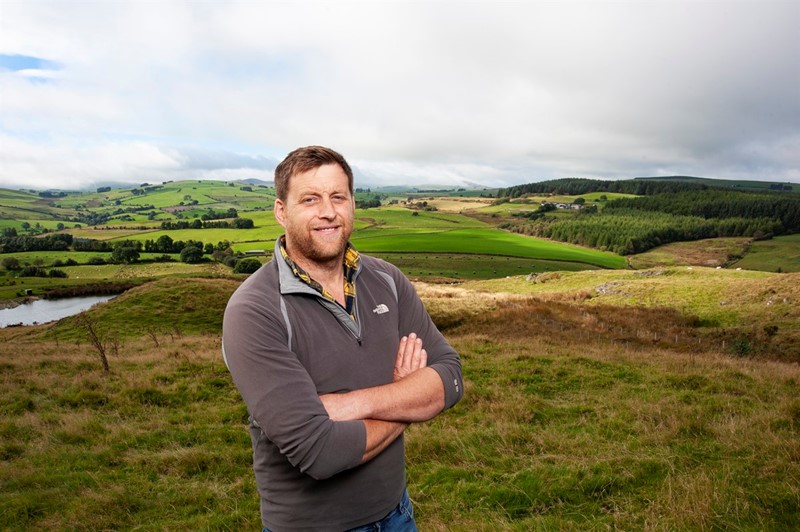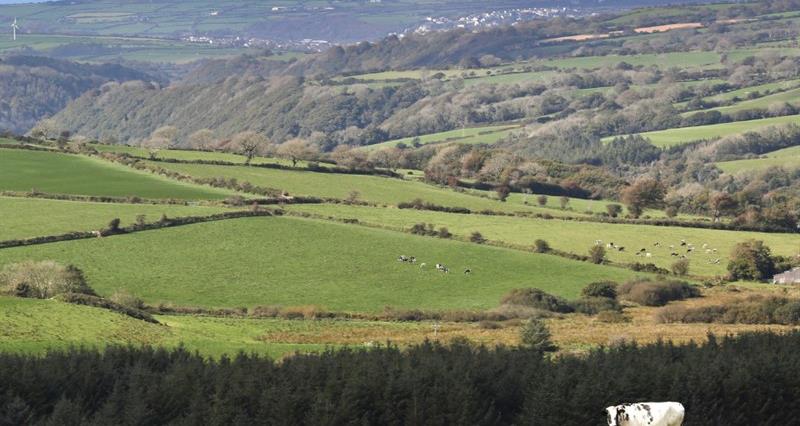Farmers and growers are already working towards net zero agriculture across Wales and Britain, taking actions such as:
- Investing in new technologies
- Reducing energy consumption from fossil fuels
- Increasing soil health
- Planting and managing trees, woodland and hedgerows
With greater government support they can accelerate this progress.
Our Journey to net zero: Farming's 2040 goal
In the NFU's new report 'Our journey to net zero', farmers including NFU Cymru Next Generation member, Llyr Jones, showcase how they are adapting their businesses to reduce agricultural emissions, capture and store more carbon on farmland and produce more renewable energy, all while providing climate-friendly, nutritious and affordable food for people at home and abroad.
The report, launched on the eve of COP26, comes two years after we first announced our ambition for Welsh and British agriculture to reach net zero greenhouse gas emissions by 2040. It sets out the further government, industry and supply chain action needed to aid farming’s transition to net zero.
The role of farmers in tackling climate change - case study

Llyr Jones, pictured above and part of NFU Cymru's Next Generation Group, farms at Derwydd, near Corwen in Denbighshire, alongside his wife, Emma. The business was traditionally a beef and sheep enterprise, but has now expanded and diversified in a number of areas including egg production, green energy and tourism. Llyr is also the co-owner of Blodyn Aur – the rapeseed oil company selling over 6,000 bottles a month of Welsh rapeseed oil to ASDA, Morrisons and Sainsbury’s in Wales.
Derwydd farms extends to 1,600 acres and is varied in terrain. In terms of livestock, the Joneses run a flock of 1,100 sheep and around 250 dairy heifers. In recent years Llyr has operated a rotational grazing system for his cattle, citing the main benefits for doing so as increased carbon storage, improved soil health and decreased worm burden for his stock.
In 2015, Llyr developed a 16,000-hen free-range egg unit on the farm which supplies Tesco on a cost of production contract. The business is expanding and work to erect a second unit, bringing total egg production to 10.5 million eggs a year, is nearing completion. Ahead of starting this work, Llyr conducted research visits at sites across Europe in order to learn how to improve the productivity of the poultry side of the business and limit its environmental impact. The new facilities include ammonia scrubbers to reduce ammonia emissions from the site by an estimated 90% . These developments mean that by November egg production will have doubled while ammonia emissions will have reduced as a result of this investment. The poultry business does not use any mains water, instead all of the water is harvested from a borehole on the farm.
Harnessing green energy to produce more food
The whole site is powered through renewable energy, largely thanks to the 30KW hydro-electric system he has had installed in 2012 on a stream on the farm, with 24KW photovoltaic panels providing a back-up source of renewable energy when warm weather reduces the flow of water to the hydro system. Llyr says: “Here in Wales we are so lucky with our environment. We have a huge amount of rainfall and big hills here, which are great ingredients for producing hydro-electricity. It’s great that we can harness this green energy to produce more food while limiting our impact on the environment.”
Meanwhile a 80KW ground and air source heat pump pumps warm air into the poultry units - a benefit for bird welfare and productivity as the hens use less energy keeping warm. It means that the hens eat less food everyday resulting in reduced lorry visits to the site – Llyr estimates that this has saved around three lorry loads of feed per year.
Great pride in producing green energy
The solar panels on the hen sheds also power Llyr’s Polaris Electric ATV and the family has recently purchased an electric vehicle for travel off the farm. Any excess energy generated is exported back to the grid.
Llyr says: “It gives me great pride that we produce green energy here at Derwydd. We try to do lots of little things that we hope will help the bigger picture.
“The other thing I have noticed is that by being environmentally friendly, it’s actually benefitted the farm. By going green it makes the bank go black.”
Llyr participates in the Welsh Government Glastir agri-environment scheme. As part of his work in this scheme, Llyr manages 1,000 acres of heather moorland by annually spraying bracken to stop it smothering the heather. He has also created lekking areas for Black Grouse – the site is now considered one of the best places to see Black Grouse in Wales thanks to his efforts.
In the last three years Llyr has undertaken significant tree planting on the farm, planting over 4,500 trees to increase carbon sequestration. He also manages seven acres of ancient woodland, is responsible for maintaining four miles of hedgerow and has creating 2.5 miles of streamside corridors. Llyr tests his soils every three years.
The importance of peatland
Llyr’s land at nearby Llandegla is home to 30 acres of peatland, something he takes great pride in protecting: “In Wales we’re in a very wet environment and we have a large amount of peatland that we graze our sheep on. It’s important that we look after these peatlands because it stores thousands of tonnes of carbon per hectare – they’re great carbon sinks.”
Llyr adds: “As a farmer I don’t want to think that I’m polluting the local environment. When I retire I want to give this farm to my children in a far better condition than I inherited it.”
More on climate-friendly farming
- Our COP Cefn Gwlad event
- Tree planting - our new #GrowingTogether strategy
- We're in for net zero - pledge now
- Achieving net zero - our key objectives
- Net Zero: NFU Farm Status Indicator
10 million homes are powered by green energy that farmers in the UK produce, and I'm really proud to play my part in that." @LlyrDerwydd rounds off #COPCefnGwlad #CountrysideCOP by highlighting that Welsh farmers are helping to achieve the UK's climate change goals 🏴🧑🌾⤵️ pic.twitter.com/bhpIJQ0jOK
— NFU Cymru 🚜 (@NFUCymru) October 15, 2021
